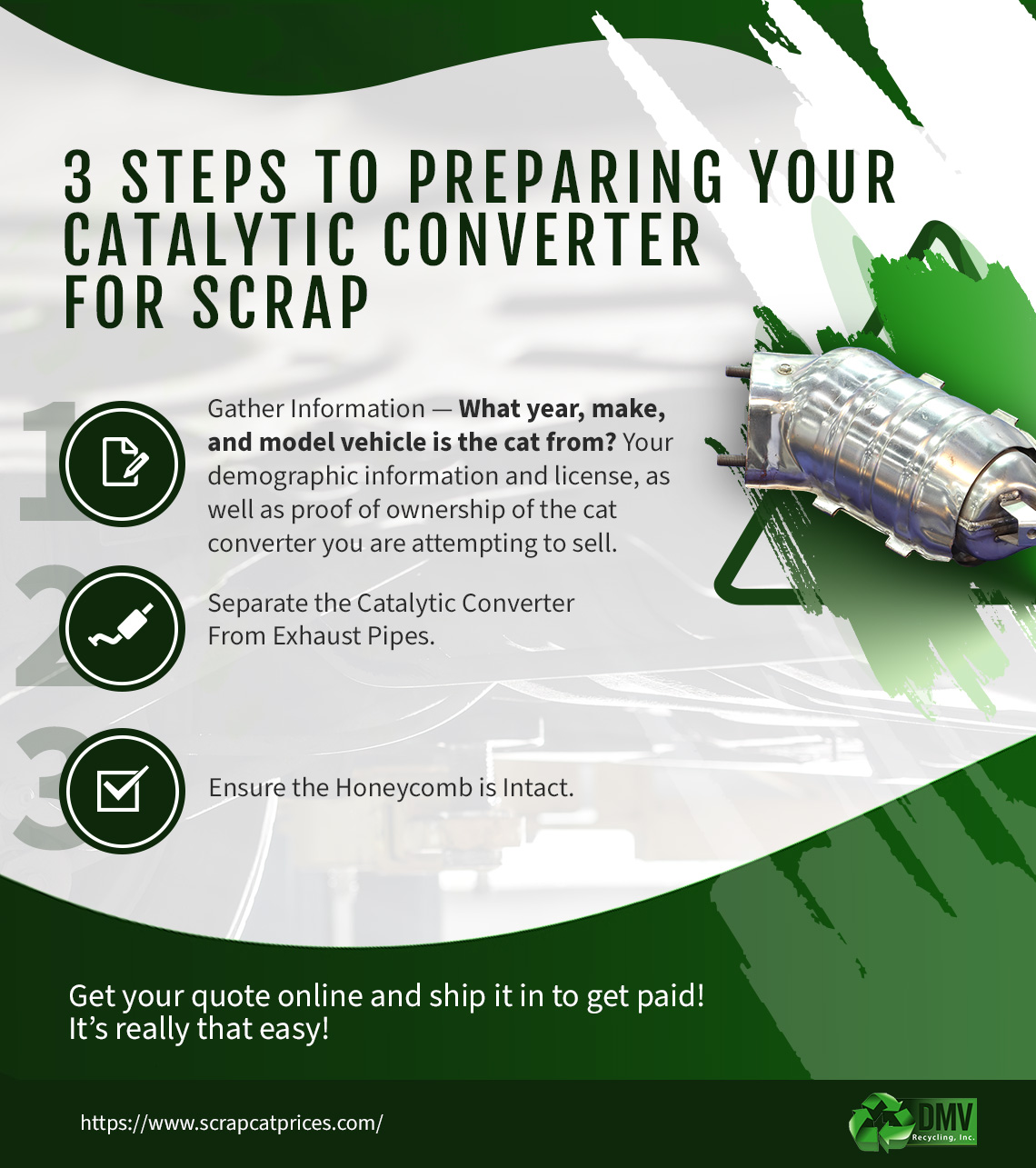About Online Catalytic Converter Recycling
Catalytic Converter Recycling
A catalytic converter is a small part in your vehicle’s engine that converts some of the dangerous gases that are produced into benign substances to help reduce hazardous exhaust. For instance, carbon monoxide and hydrocarbons are converted into carbon dioxide and water. Catalytic converters are made with a variety of metals including platinum, palladium, copper, nickel, cerium, iron, rhodium, and manganese. All of these metals are recyclable, and rhodium, platinum, and palladium, in particular, are incredibly valuable in the jewelry, electronics, and industrial industries. Removing your catalytic converter and extracting these metals isn’t an easy process, which is why catalytic converter recycling exists!
At DMV Recycling, we pay you cash for your failed catalytic converters so that some of the precious metals inside can be extracted and reused. Not only does this put cash in your pocket, but it helps protect the environment by reusing the precious metals rather than necessitating the need for mining more. Discover how the recycling process works and how much money you can get for your catalytic converter, and then send it to us for cash in your pocket today!

“Good customer service! No one can beat them.”
~ Franklin P.

Why You Should Recycle Your Catalytic Converter
One of the perks that should motivate you to recycle your catalytic converter is the lucrative return you can receive. Catalytic converters are full of precious metals that can be recycled, and metal recycling plants are willing to pay top dollar for your cat converter. More altruistic reasons to recycle your cat converter include helping to protect the environment and reducing the recyclable materials that take up space in our landfills or junkyards.
All of the precious metals found in catalytic converters are mined from the earth. In fact, in a single catalytic converter, there are between 3 and 8 grams of precious metals, and it takes approximately 8 tons of raw ore to yield a single ounce of platinum — that’s a LOT of mining. Mining non-renewable resources damages the earth and has a negative impact on the environment. Recycling your scrap catalytic converter offers you the opportunity to do what you can to reduce your environmental impact, and upcycle your cat converter into another useful product. Mining operations take energy and can harbor a lot of unsafe working conditions for the miners who retrieve materials. Recycling your cat converter can help reduce the number of miners working underground.
Help make new products, reduce mining and the impact of metal mining, all while making some money!
How to Recycle Your Catalytic Converter
Are you convinced that recycling your catalytic converter is the best option and now you need to know how to go about accomplishing it? You’ve come to the right place! At DMV Recycling, we will purchase your catalytic converters at top dollar and recycle them for you. There are a few things you should know before you attempt to recycle your catalytic converter:
First things first, you’ll need to know a little information about the cat converter you are attempting to recycle. You’ll need to know the year, make, and model of the vehicle your catalytic converter came from, as well as whether it is the original or an aftermarket cat converter in order to get an accurate quote. If there is a serial number on the outside shell, you can use that for an even more accurate quote.
Next, you’ll need to know how to prepare your catalytic converter for recycling. Once removed from the vehicle, there's no need to worry about cleaning it, unless you need to wipe it down to find the serial number. You’ll have to remove the exhaust pipes attached to either end, but do not remove anything else. The shell and the internal honeycomb should remain intact. Removing the honeycomb or any other parts decreases the value of the cat converter and can be dangerous to handle.
The final steps are to look up your catalytic converter from our database to get a quote based on current rates and then send it in. Once DMV Recycling receives your cat converter, you’ll receive payment and your part is done! If you have any questions or can’t find your catalytic converter on our site, contact us and our staff will be happy to help.


What to Look For in a Catalytic Converter Recycler
Before sending your catalytic converter off to just anyone, there are a few things that you should consider about the company you are trusting with your scrap cat.
Are they giving you what it’s worth?
Before investing in a catalytic converter recycling company, make sure they aren’t attempting to undersell you and are giving you what your metal is worth. If you need to, do some research, since it isn’t difficult to find the current best rates and ask for just that. If the company is lowballing you or won’t give you a quote until they receive the cat converter, find someone else.
What are they going to do with it?
While the main motivating factor for you to recycle your catalytic converter is to get some cash back, you are also doing the right thing for the earth. You may be interested in what the company you are handing your cat converter over to is going to do with it as well.
Are they trustworthy?
When you are sending your precious metals in the mail before getting paid, you want to ensure you can trust the company. Look for online reviews and testimonials to see what others have to say. You can check Google reviews or their social media — like our Facebook page. A company that gives you a direct quote, and has an actual person that you can get a hold of, is a company that offers transparency and is likely a company you can trust.
What Happens to Your Catalytic Converter Once You Recycle It
We’ve talked a lot about the precious metals contained in your catalytic converter and you may be thinking to yourself "if it is so precious and valuable, why don’t I just extract the metals myself?" Please don’t. The process of extracting these metals is incredibly dangerous and really complicated. All of the metals contained in your cat converter are blended together, and separating them is not a quick or easy process.
The three main metals that are extracted because of their value are platinum, palladium, and rhodium, referred to collectively as platinum metals. These metals are used in jewelry making, electrical components, and in industrial settings. Each catalytic converter contains between 3 and 8 grams of precious metals, so most smelters group cat converters by the hundreds to extract the metals.
Once the metals are extracted, they can be used in jewelry, lab testing equipment, implanted surgical devices, and electronic components. These metals are considered precious because of their inherent corrosion and oxidation-resistance, biocompatibility, high melting temperature, and excellent conductivity. It is far more cost-effective — and environmentally-friendly — way to use recycled materials rather than mining them from the earth. If you have a defunct catalytic converter, recycling it with DMV Recycling is your best option.

Why DMV Recycling is So Vigilant About Buying Catalytic Converters

We get the question a lot — why do you need my VIN number and car title to sell you my busted catalytic converter? Simple, we are a legitimate business and want to keep it that way! Historically, metal sales have been an avenue for crooks to make money off of metal that was not theirs and usually is not “scrap” at all. At DMV Recycling, we are a clean business and want to protect ourselves, our customers, the residents of DMV, and the environment from those who would steal vital metal components to sell for quick cash.
Wherever there is potential to make money, there will be scam artists looking to make a quick buck and exploit honest practices to boost their own bottom line. Catalytic converter recycling is an enterprise that has, historically, made it all too easy for the clever con man to easily profit off the misfortune of fellow man.
Nationwide, there have been reports of outside air conditioning units being stripped of their copper wiring, for pennies on the dollar. Catalytic converters are much more lucrative — bringing in between $60 and $300 a pop. With price tags like this, all it takes is a little know-how for the wrong people to start popping off catalytic converters in a parking lot and selling them for a quick buck. To help prevent theft and protect citizens, legitimate catalytic converter recyclers will always ask for proof that the cat is the seller’s to sell.
Virginia state law requires a salvage metal dealer to record the time and date of the transaction, scan a copy of an ID and get a license plate number and signature of the seller, along with “the scrap metal purchaser shall document a diligent inquiry into whether the person selling or delivering the same has a legal right to do so.” Additionally, some states that we do business with also require a fingerprint from the scrap metal seller. All of these laws are in place to protect the public from thieves who target unprotected metals.
At DMV Recycling, we have established relationships with those we do business with and practice cat converter, junk car, and scrap metal recycling with a strong moral compass and unparalleled integrity. We run a legitimate business to protect our employees, our customers, and our communities.
It’s a dirty job, but at DMV Recycling, we keep our hands clean and your car protected.
What Metals Make Up a Catalytic Converter?
Many people ask why catalytic converters are so valuable and why we care so much about them. Aside from the fact that many catalytic converters are laid to rest in a junkyard, doomed to spend their years polluting the earth and contributing to the mining of resources to make new cats, the catalyst component of catalytic converters are made of highly precious metals. The main body, or exterior, of the cat is made of aluminum oxide, titanium dioxide, or a mixture of silica and alumina. All of these elements can be recycled, but are fairly inexpensive. The catalyst, or internal portion is made of heavy precious metals in small quantities.
What Precious Metals Are Used?








Catalytic Converter Frequently Asked Questions
Why Your Catalytic Converter is So Valuable
The recycled precious metals in catalytic converters can be used to create a variety of products, reducing the need to mine for new materials.
Some of these items include:

Industrial Parts

Electronic Devices

Jewelry
Why Recycle With DMV Rather Than DIY?
The amount of precious metals in the catalytic converter are minimal, meaning on their own, you wouldn’t get very much in return. But, the best reason to trust heavy metal recycling from a catalytic converter to the professionals is the danger factor. The precious metals used in the catalytic converters are used as catalysts and are highly reactive to each other and other elements. If you attempt to recover the metals yourself, you could end up being injured.
At DMV Recycling, we have experience in handling these elements and recycling a variety of car parts and metals. Get the most for your catalytic converters with transparent pricing and fair trade. Sell your catalytic converter to get money in your pocket and help reduce your carbon footprint. Connect with us today to learn more.


Find Your Cat Converter
Use our catalytic converter recycle page to find your cat converter, fill in the necessary information, we will give you a quote. If you don’t see your cat converter, simply fill out the form on our sales page and we can give you a manual quote.

Ship
Once you are satisfied with our purchase price, we will seal the deal and you’ll ship your catalytic converter to us.

Get Paid
Once we have received your cat converter, we send you your payment!


